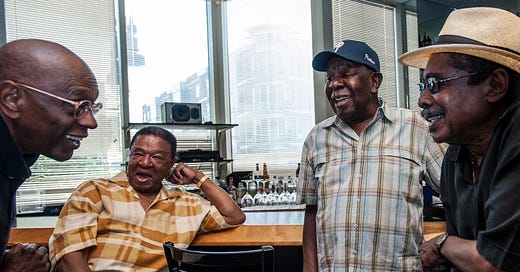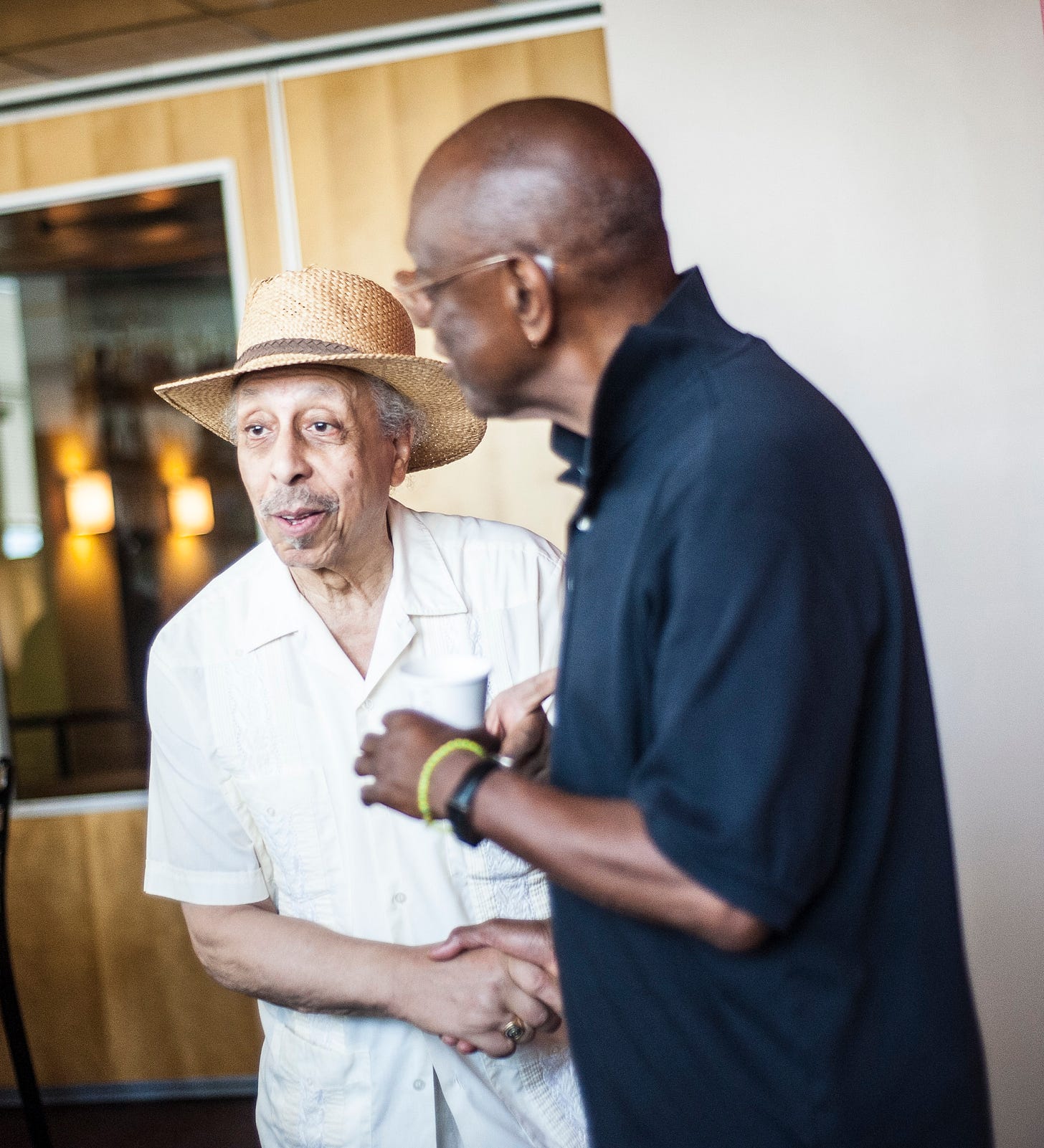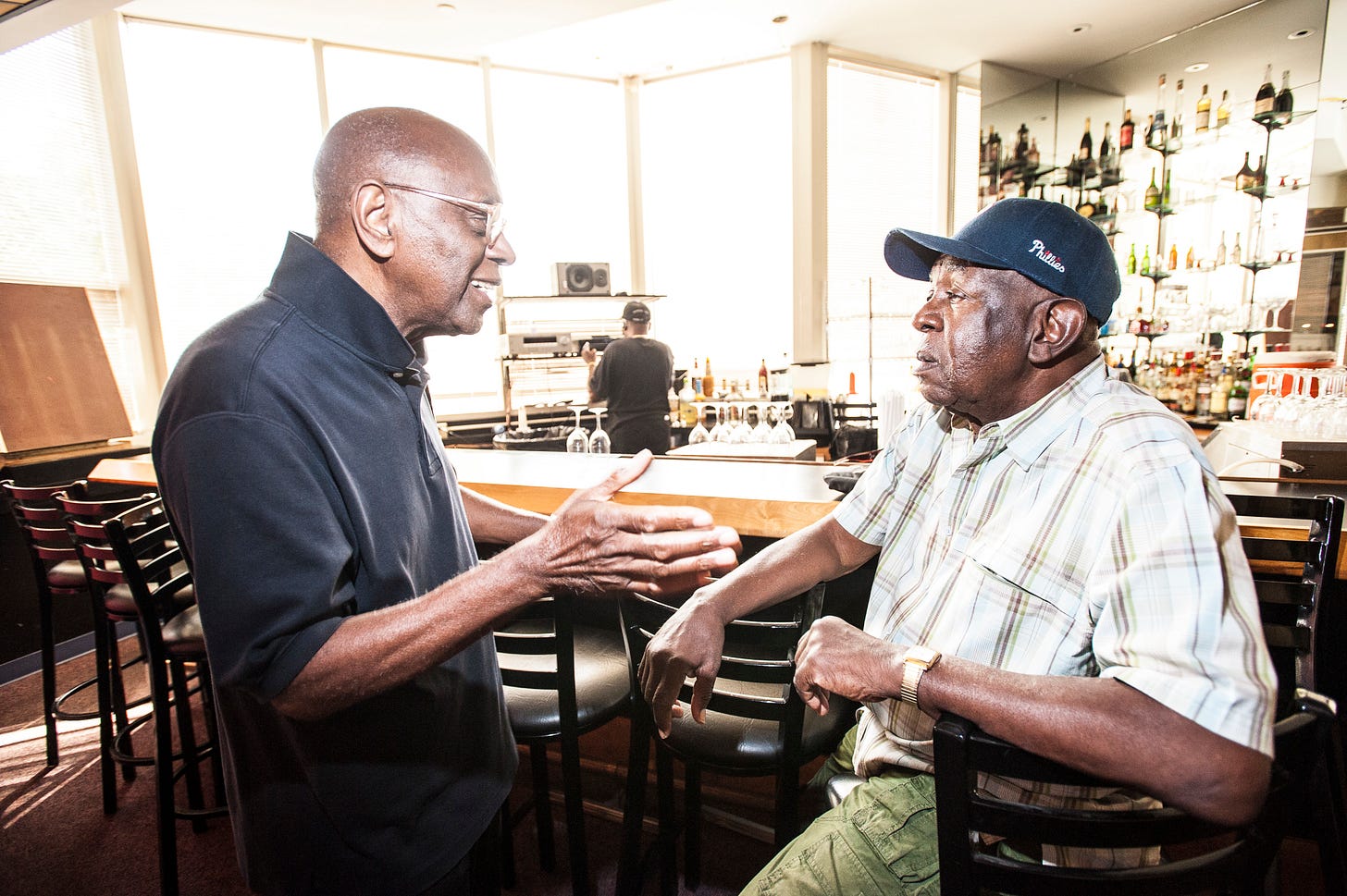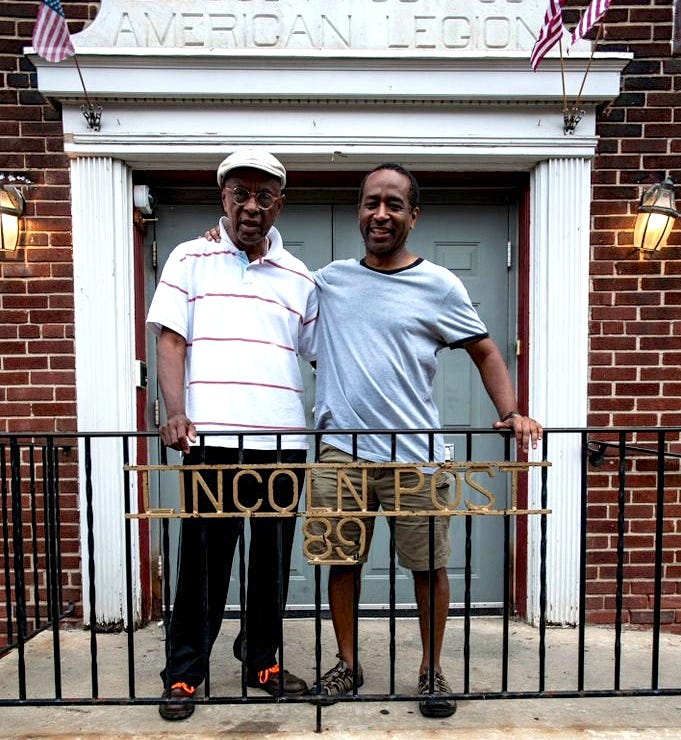TT 387: Tootie Heath at the Clef Club (3)
A bright day in Philadelphia -- and a coda about Percy Heath
(This is the third post for the late great Tootie Heath.)
The unions were segregated. James Reese Europe inaugurated the Clef Club in 1910 for black musicians in New York City, and in 1934 another Clef Club — AKA Local #274 — opened in in Philadelphia. The rolls of Local #274 included John Coltrane, Nina Simone, and the three Heath brothers.
On October 6, 2014, several of the old guard gathered at the Clef Club to share a glass and tell stories. Tootie Heath was the guest of honor, for he hadn’t been around his hometown all that much in recent years. Everyone else there that day didn’t have far to drive.
Tootie Heath, Buster Williams, Mickey Roker, Sam Reed:
The closest friends Tootie still had in Philadelphia at that time were saxophonist Sam Reed and Billy Bonner (better known as Fundi). Sam was not just a local jazz hero but also the musical director for Teddy Pendergrass. Fundi wasn’t a player, but rather a proficient carpenter; eventually he would go to be tour manager for Herbie Hancock during the Mwandishi years. (Tootie got Fundi that gig.)
Billy Bonner AKA Fundi:
Even Bill Carney came. (Carney was the leader of the Hi-Tones, the early ‘50s group with wife Shirley Scott, John Coltrane, and Tootie Heath.)
Bill Carney and Tootie:
This special event was arranged by Tony Creamer, who also commissioned Michael Perez to take photos. Hyland Harris also helped to make sure the right people got invited in a friendly manner. It was a fairly epic occasion: Tony, Hyland and I stood around with our mouths agape while we listened to the laughter and the stories.
Tootie Heath and Mickey Roker. (Talk about swing.)
This is my own picture of Hyland Harris and Tootie Heath:
Hyland wrote about the day at the Clef Club:
It was one thing just being around Tootie and watching him up close… his every move, every observation, and of course every joke that rolled off of his lips. That was already enough to send me back into the shed and rethink everything.
However, it was the Clef Club get together that did me in.
You know there is this undying effort to whiten up the history of jazz. It just refuses to go away.
My retort was always… look at the great Migrations… black people took an evolving culture with them and this is where all of these strong jazz communities flourished. How many jazz musicians came from Salt Lake City?
Years ago I hung around Bob Hurst and Jeff Watts saw them constantly trying to (humorously) one up each other with the Detroit vs Pittsburgh jazz wars… this is when I began to notice these regional differences are really minor. The commonality was more important: jazz was a big deal in these working class black communities and these communities nourished and continually produced talent.
Unlike today’s musicians these musicians were socialized in this environment and in the greater world. Trane and Tommy Flanagan played dances and R ’n B gigs; they were also drafted into military service, got married young and lived in these communities.
It came together for me seeing Tootie and Roker and Buster — three of the baddest muthafuckers on the planet — talking everything from paratrooper experience to doing gigs with Sonny Stitt weeks out of high school. Any performance we enjoy by these musicians is not just a testament to how great of an artist these guys are but also the community that produced them. The above list of Philly jazz cats represents the fruit of a community. However we should also think of the names we will never hear about: the bakers, laborers, construction workers, house cleaners, doctors, and lawyers who were the fabric of that community. Without them, Tootie and Buster would not have anyone to play for.
That stuff is never talked about but it was as clear as day at the Clef Club. For me, that is what “Philly Beat” is all about. — HYLAND HARRIS
It’s sad to say, but Tootie Heath, Bill Carney, Mickey Roker, Fundi, and Sam Reed have all passed on since that day at the Clef Club.
The album Philadelphia Beat was recorded around the time of the Clef Club gathering. From my notes:
Philadelphia produced many musicians who made modern jazz history. The Miles Davis quintet with Coltrane was 3/5ths Philly. The Coltrane quartet was 3/4ths Philly. The Art Blakey quintet heard on Moanin’ was 4/5ths Philly.
Tootie Heath remembered playing with the following list of musicians in the 1950’s before moving to New York. Most of these people were born in Philadelphia but a few settled there as youngsters; there’s also an occasional assist from Camden across the river.
Hassan Ibn Ali, Bootsie Barnes, the Barron brothers Bill and Kenny, the Bryant brothers Ray and Tommy, Jimmy Bond, Johnny Coles, Steve Davis, Spanky DeBrest, Walt Dickerson, Sam Dockery, Bill Doggett, Charles Earland, Sonny Fortune, Jimmy Garrison, Red Garland, Benny Golson, the Grimes brothers Leon and Henry, the Grubbs brothers Earl and Carl, Rufus Harley, Arthur Harper, Louie Judge, Owen Marshall, Pat Martino, Cal Massey, Eddie McFadden, Jymie Merritt, Jimmy McGriff, Lee Morgan, Jimmy Oliver, Don Patterson, Trudy Pitts, Odean Pope, Red Rodney, Billy Root, Jimmy Rowser, Dennis Sandole, Shirley Scott, Thornell Schwartz, Clarence “C” Sharpe, Archie Shepp, Jimmy Smith, McCoy Tyner, father and son Charles and Buster Williams, Lem Winchester, and Reggie Workman.
Fellow drummers included teachers and peers Donald Bailey, Edgar Bateman, Bobby Durham, Lex Humphries, Billy James, Philly Joe Jones, Charles Rice, Mickey Roker, Ronald Tucker, and Specs Wright.
There are nice things on all three albums with Tootie, Ben Street, and myself, but there’s little doubt in my mind that the live experience of that trio was what really mattered. I’ve had many people comment on how amazing it was to see Tootie play drums in an uncomplicated piano trio, and they were right: It truly was amazing. Ben and I just tried to stay the course and let Tootie’s cymbal beat speak.
If forced to choose, I’d nominate “Good Bait” from Live at Smalls, “The Danube Incident” from Tootie’s Tempo, and “Bag’s Groove” from Philadelphia Beat as representative of the trio at its most intriguing and fully realized.
In a DownBeat blindfold test, Philadelphia drummer Ralph Peterson Jr. commented favorably on “Reets ‘n I” from Philadelphia Beat.
I got a lot of great stuff from Tootie down on the official record during the interview, but of course there’s so much more that is gone in the air. One thing I just remembered yesterday was about Vernel Fournier. Tootie said that Fournier came to the house when he was a kid and showed him how to tune the bass drum.
In that era, everyone adored the Ahmad Jamal trio with Israel Crosby and Vernel Fournier. Tootie said that the working unit of Bobby Timmons, Ron Carter, and Tootie Heath (heard on a famous record at the Village Vanguard) was a direct attempt to play like Jamal, Crosby, and Fournier, although obviously cut with Timmons’s Philadelphia soul.
Percy Heath was the eldest and perhaps the most conventionally successful of the three Heath brothers. Certainly any good bassist will look you in the eye and tell you Percy was one of the very greatest of all time; in addition, Percy lived a rather glamorous life out on Montauk at the edge of Long Island.
Some of Percy’s Montauk story is told in this 1998 Nancy K. S. Hochman article in the New York Times.
Mr. Heath, 75, is the founding bass player for the internationally acclaimed Modern Jazz Quartet. After 43 years of touring, he said, he is ''fishing for peace and quiet.''
''There's nothing more restful than drifting on a boat,'' he said as he guided the Boston Whaler, aptly named The Fiddler, out of the marina at West Lake Fishing Lodge and into Block Island Sound.
About two miles offshore, he shut down the engine. Dressed in a Modern Jazz Quartet T-shirt, jeans and knee-high rubber fishermen's boots, Mr. Heath removed a small piece of fluke from his ice chest, attached the bait to his hook and cast. Holding on to the rod to feel the fish's tug, he waited patiently for a nibble.
Percy moved his family out to Montauk in the early ‘60s. What is not in the article is something told me by Tootie personally: Percy’s family was the first black family in Montauk, and it was really a struggle. That all-white fishing community truly resented the new faces. But Percy stuck the course, and in time became beloved in the tiny town, partly because he was just such a good fisherman. Eventually a plaque was erected in memory of Percy on Montauk beach.









